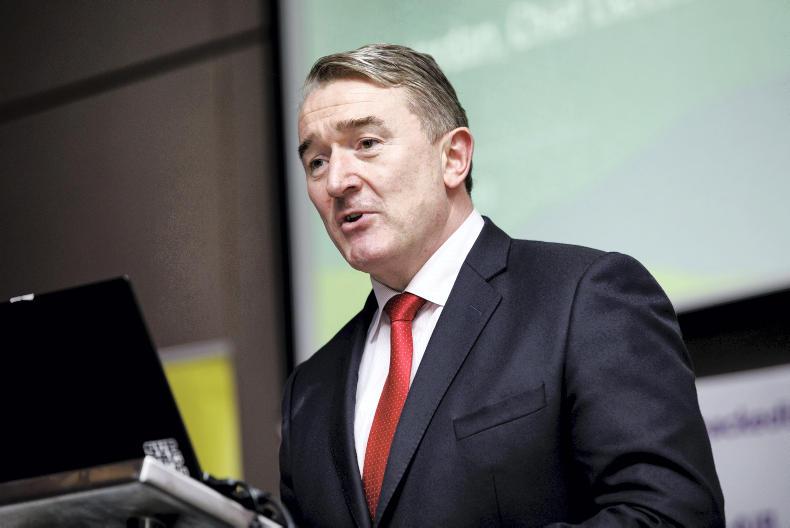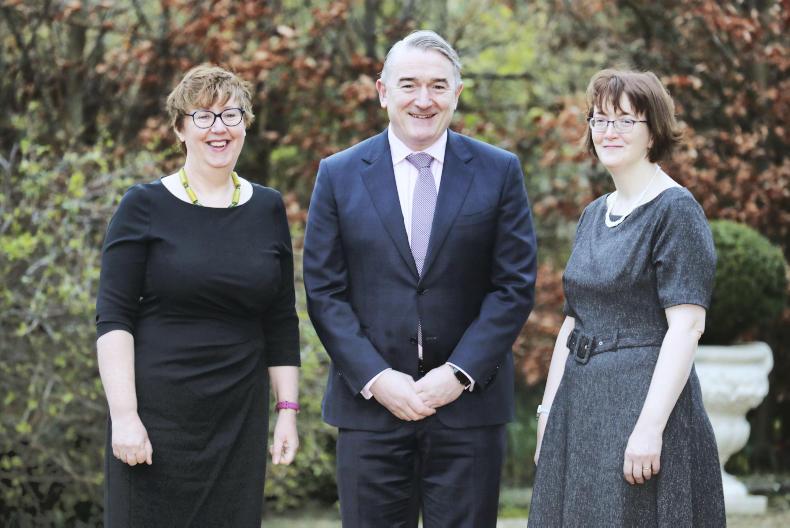Ornua chief executive John Jordan has said that “diversity is not a gender issue, but a business issue”.
Ornua’s 15-member board has no female representative he told attendees at a Ceres Network event ‘Striking the Gender Balance in Irish Agri-food’ in Naas on Tuesday morning.
“Reflecting on our sector, there is only 3% female representation on Irish co-operative boards. Our own board (Ornua) of 15 has no female representation,” said Jordan.

Ornua CEO John Jordan. \ Donal O'Leary
“The graduates that we all want to recruit live in a very diverse world and it jars with them to come to a non-diverse workplace. Diverse teams that collaborate better deliver better results.”
Jordan said that the key to improving the situation in Irish firms is down to trust and part of that trust is taking action.
While Ornua has no control over who gets appointed to its board, it does control staff recruitment and this is the area it has focused on improving its diversity.
Recruitment for graduates is now 50:50 male to female. Succession plans in 2016 were 83% male to 17% female and this is now 65% male to 35% female in 2019.
The Ornua global leadership programme is now 75% male to 25% female, a considerable improvement on the 87:13 male to female ratio in 2017.
Not up to standard
When questioned about how the Department of Agriculture made changes to its diversity, Assistant Secretary General Sinéad McPhillips said that the agriculture industry was not performing up to standard, with a low number of women on boards and a low number of women in leadership.
“For any sector that is not seen as inclusive, you will not be an employer of choice and you will not attract the best people. This is the burning platform, as they will go elsewhere,” she said.
The recommendations that the National Women and Girls strategy made, at the Department’s suggestion, were to firstly encourage female entrepreneurs, particularly in rural areas.
The Acorns programme came out of this, which provides clear mentoring and learning, promoting the growth of the business.
“In the sector itself, one of the issues that had come up was taxation barriers, which might have been more perceived barriers, such as putting farms in joint names, to real barriers,” said McPhillips.
“The Department of Agriculture worked with the Department of Finance and with Revenue to clarify some of these issues. So that, for example, putting the farm in joint names didn’t create a barrier to someone qualifying for agricultural relief.”
Farm ownership
Only 10% to 11% of farms are in women's names, according to the Department’s databases, and only about 2% are in joint names of husband and wife.
There is another small percentage in partnerships and family partnerships, but it is very low.
“Less than 10% of CAP payments are going to women and if you take that from a gender budgeting perspective, 90% of funding is going to one gender and this is not seen in other areas of public expenditure,” she outlined.
McPhillips said that this was a platform for change and that gender is being talked about in terms of the next CAP, which is a big change in culture in Brussels.
Read more
‘Farm family not recognised for diversity’
Drop in number of female farmers
Under-representing women is ‘just silly’ – Australian farm minister
Ornua chief executive John Jordan has said that “diversity is not a gender issue, but a business issue”.
Ornua’s 15-member board has no female representative he told attendees at a Ceres Network event ‘Striking the Gender Balance in Irish Agri-food’ in Naas on Tuesday morning.
“Reflecting on our sector, there is only 3% female representation on Irish co-operative boards. Our own board (Ornua) of 15 has no female representation,” said Jordan.

Ornua CEO John Jordan. \ Donal O'Leary
“The graduates that we all want to recruit live in a very diverse world and it jars with them to come to a non-diverse workplace. Diverse teams that collaborate better deliver better results.”
Jordan said that the key to improving the situation in Irish firms is down to trust and part of that trust is taking action.
While Ornua has no control over who gets appointed to its board, it does control staff recruitment and this is the area it has focused on improving its diversity.
Recruitment for graduates is now 50:50 male to female. Succession plans in 2016 were 83% male to 17% female and this is now 65% male to 35% female in 2019.
The Ornua global leadership programme is now 75% male to 25% female, a considerable improvement on the 87:13 male to female ratio in 2017.
Not up to standard
When questioned about how the Department of Agriculture made changes to its diversity, Assistant Secretary General Sinéad McPhillips said that the agriculture industry was not performing up to standard, with a low number of women on boards and a low number of women in leadership.
“For any sector that is not seen as inclusive, you will not be an employer of choice and you will not attract the best people. This is the burning platform, as they will go elsewhere,” she said.
The recommendations that the National Women and Girls strategy made, at the Department’s suggestion, were to firstly encourage female entrepreneurs, particularly in rural areas.
The Acorns programme came out of this, which provides clear mentoring and learning, promoting the growth of the business.
“In the sector itself, one of the issues that had come up was taxation barriers, which might have been more perceived barriers, such as putting farms in joint names, to real barriers,” said McPhillips.
“The Department of Agriculture worked with the Department of Finance and with Revenue to clarify some of these issues. So that, for example, putting the farm in joint names didn’t create a barrier to someone qualifying for agricultural relief.”
Farm ownership
Only 10% to 11% of farms are in women's names, according to the Department’s databases, and only about 2% are in joint names of husband and wife.
There is another small percentage in partnerships and family partnerships, but it is very low.
“Less than 10% of CAP payments are going to women and if you take that from a gender budgeting perspective, 90% of funding is going to one gender and this is not seen in other areas of public expenditure,” she outlined.
McPhillips said that this was a platform for change and that gender is being talked about in terms of the next CAP, which is a big change in culture in Brussels.
Read more
‘Farm family not recognised for diversity’
Drop in number of female farmers
Under-representing women is ‘just silly’ – Australian farm minister







 This is a subscriber-only article
This is a subscriber-only article










SHARING OPTIONS: